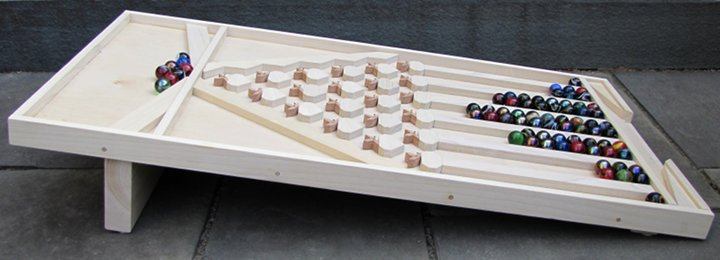With the baseball season winding down, and "magic numbers" on the minds of many fans, my mind turns to ol' Pascal's Pinball Machine.

That's how I explain it to my friends -- not that I teach math, but sometimes I get the chance to veer away from literature for a while. If you imagine a ball dropped from above and banging against one post or another, with an equal chance of the ball's bouncing to the left or the right as it falls, then Pascal's Pinball Machine gives you the number of paths the ball may take to end up at a particular post in a particular row. That's why it gives you the coefficients of a binomial expansion: think of every choice of X as a bounce to the left, and every choice of Y as a bounce to the right.
Anyhow, the Pinball Machine can tell you, given a certain number N of events with equal probability (to simplify the problem), how many ways there are to get exactly M favorable results. So if you and your opponent have 40 games left, and your magic number is 14, you want to know what the odds are that you will get at least 14 out of the 40 to go your way. So the Pinball Machine will tell you the odds of NOT getting 14: of getting 1, 2, 3, 4, and so on, up to 12; and 13 would land you in a tie, so you take half of that, add it in with the rest, etc.
Now, the delightful thing is that you can do Pascal's Triangle in such a way as to answer the question, "What are the odds that you will get AT LEAST M out of N events to go your way?" AT LEAST 14 heads out of a coin flipped 40 times, that is.
Here's what you do. On one side, you put 1, as in the regular triangle, and on the other side you put the powers of 2. Then you follow the rule for Pascal's triangle: the value of the place in the next row is the sum of the values of the two places above it in the previous row. I can't do the spacing right, but it looks like this:
1
1 2
1 3 4
1 4 7 8
1 5 11 15 16
1 6 16 26 31 32
1 7 22 42 57 63 64
1 8 29 64 99 120 127 128
1 9 37 93 163 219 247 255 256
And so on. What that means: if you are asking, "What are the odds that you will get AT LEAST 3 out of 8 heads if you flip the coin 8 times?", the answer is the fourth place from the right on the final row, divided by the number at the extreme right: 217 out of 256. In other words, if you and the opponent have each 4 games left (not against each other), and your magic number is 3, random chance suggests that you have a 219/256 chance of getting that 3. Of course, if you get only 2, that means you end in a tie, so you should take half of that particular value and add it in, if you want to calculate your chances of winning the division.
This is all predicated on the supposition that you have a 50 percent chance of winning, and so has your opponent. In reality, you both have a more than 50 percent chance, because we're talking about good teams here. The higher the chance, the MORE likely you are to get at least your magic number; the 50-50 division represents the worst case.
An odd thing about the sum of the numbers in THESE rows: it appears that they all going to be 2^x (P), with P either 1 or a prime number. But I should investigate it further. There doesn't seem to be any particular reason why it must be so...